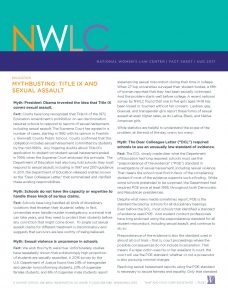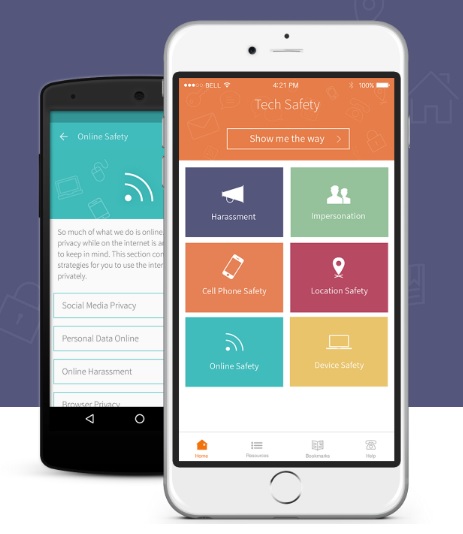Start a Search:
Author: Action Alliance
National Resource Center on Domestic Violence
Since 1993 the National Resource Center on Domestic Violence (NRCDV) has been a comprehensive source of information for those wanting to educate themselves and help others on the many issues related to domestic violence.
National Sexual Violence Resource Center
The National Sexual Violence Resource Center (NSVRC) opened in July 2000 as a national information and resource hub relating to all aspects of sexual violence. The NSVRC staff collects and disseminates a wide range of resources on sexual violence including statistics, research, position statements, statutes, training curricula, prevention initiatives and program information.
National Women’s Law Center - Mythbusting Title IX and Sexual Assault

Nearly one in five undergraduate women experience sexual assault or attempted sexual assault while in college, as do too many men and gender non-conforming students. Title IX of the 1972 Education Amendments requires that schools prevent and respond to reports of sexual harassment, including rape, to ensure survivors can continue to learn in the wake of violence. Despite significant evidence to the contrary, some critics argue that survivors of sexual misconduct on college campuses have too many rights. Myths like these are inconsistent with the law and ignore the real experiences of students subjected to sexual harassment. Below are other myths and facts about sexual assault and Title IX.
New Resource for Victims of Technology Harassment
(as posted on the NNEDV website on July 26, 2016)

The National Network to End Domestic Violence (NNEDV) is excited to announce the release of a new mobile app offering resources for victims of technology-facilitated stalking or abuse. The Tech Safety App is an educational mobile app that helps users identify how abusers can harass them by misusing technology and learn what steps they can take to enhance their technology safety and privacy.
This app takes advantage of the NNEDV Safety Net project’s more than 15 years of working on the intersection of technology abuse and violence against women, and who have provided expert advice, trainings, and consultation on this issue to thousands of survivors of abuse, victim service providers, and technology companies. This app is another way to get information into the hands of survivors.
The app is available on iOS and through the Google Play store. Click here for more information.
Nonprofits and Lobbying: General Information
as originally publised on VAWnet:
While nonprofit organizations need to be aware of restrictions on the amount of “lobbying” in which their organization can engage, many activities that can help educate policymakers and influence policy development are not considered “lobbying” and therefore are not subject to those limitations.
Many activities that can help educate policy makers are not considered to be “lobbying” under the IRS rules. In its guidance, the IRS notes that nonprofit organizations may conduct educational meetings, prepare and distribute educational materials, or otherwise discuss public policy issues in an educational manner that is not focused on influencing specific legislation.
Included on this page are explanations of federal guidelines and IRS tools used to measure nonprofit organizations’ lobbying activities, advice for complying with limitations on nonprofits’ ability to lobby, as well as specific information and resources for domestic and sexual violence agencies

